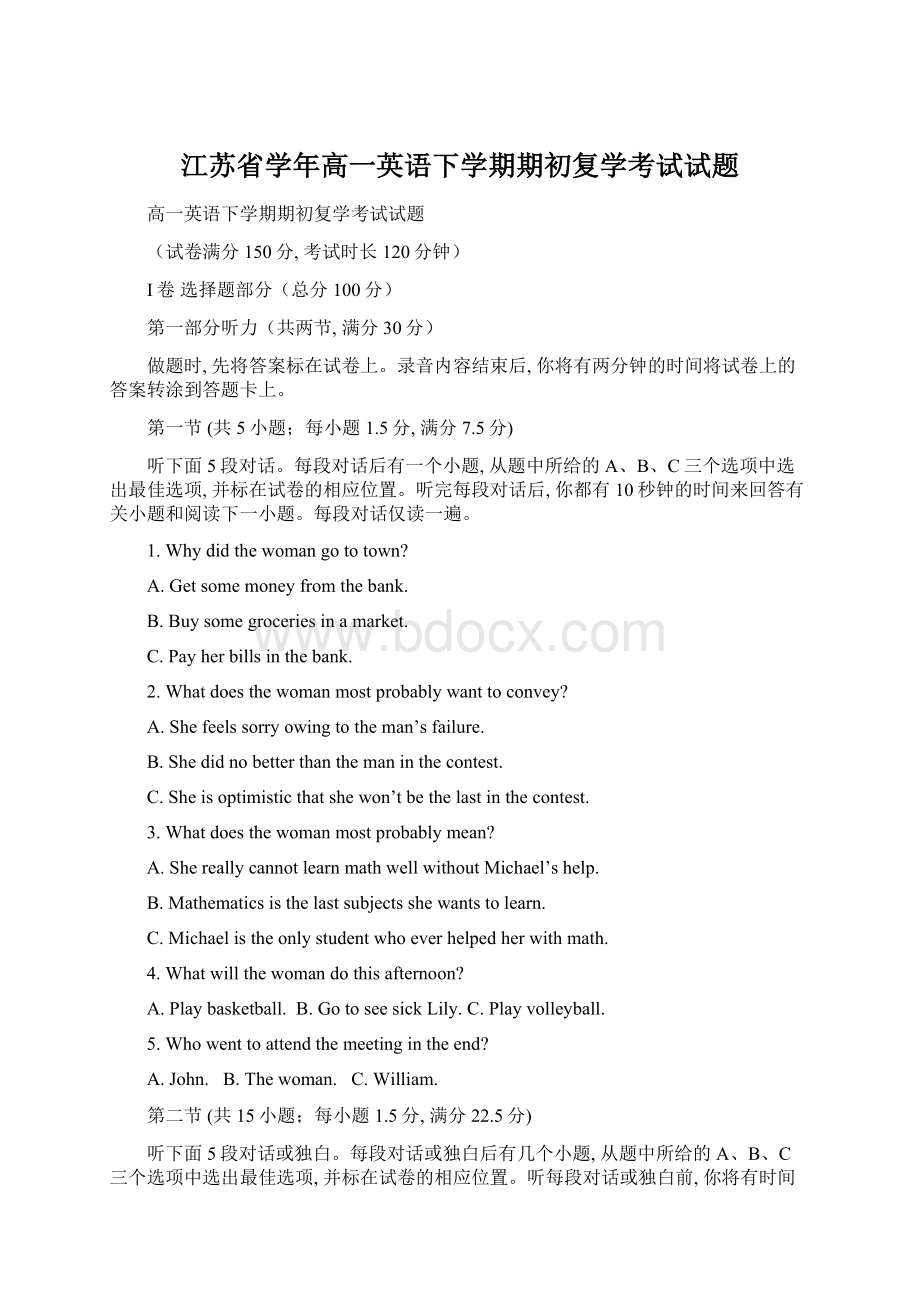江苏省学年高一英语下学期期初复学考试试题.docx
《江苏省学年高一英语下学期期初复学考试试题.docx》由会员分享,可在线阅读,更多相关《江苏省学年高一英语下学期期初复学考试试题.docx(25页珍藏版)》请在冰豆网上搜索。

江苏省学年高一英语下学期期初复学考试试题
高一英语下学期期初复学考试试题
(试卷满分150分,考试时长120分钟)
I卷选择题部分(总分100分)
第一部分听力(共两节,满分30分)
做题时,先将答案标在试卷上。
录音内容结束后,你将有两分钟的时间将试卷上的答案转涂到答题卡上。
第一节(共5小题;每小题1.5分,满分7.5分)
听下面5段对话。
每段对话后有一个小题,从题中所给的A、B、C三个选项中选出最佳选项,并标在试卷的相应位置。
听完每段对话后,你都有10秒钟的时间来回答有关小题和阅读下一小题。
每段对话仅读一遍。
1.Whydidthewomangototown?
A.Getsomemoneyfromthebank.
B.Buysomegroceriesinamarket.
C.Payherbillsinthebank.
2.Whatdoesthewomanmostprobablywanttoconvey?
A.Shefeelssorryowingtotheman’sfailure.
B.Shedidnobetterthanthemaninthecontest.
C.Sheisoptimisticthatshewon’tbethelastinthecontest.
3.Whatdoesthewomanmostprobablymean?
A.ShereallycannotlearnmathwellwithoutMichael’shelp.
B.Mathematicsisthelastsubjectsshewantstolearn.
C.Michaelistheonlystudentwhoeverhelpedherwithmath.
4.Whatwillthewomandothisafternoon?
A.Playbasketball.B.GotoseesickLily.C.Playvolleyball.
5.Whowenttoattendthemeetingintheend?
A.John.B.Thewoman.C.William.
第二节(共15小题;每小题1.5分,满分22.5分)
听下面5段对话或独白。
每段对话或独白后有几个小题,从题中所给的A、B、C三个选项中选出最佳选项,并标在试卷的相应位置。
听每段对话或独白前,你将有时间阅读各个小题,每小题5秒钟;听完后,各小题将给出5秒钟的作答时间。
每段对话或独白读两遍。
听下面一段对话,回答第6和第7题。
6.Whatfestivalisitthedayaftertomorrow?
A.Christmas.B.Halloween.C.Thanksgiving.
7.WhowillthewomanhavedinnerwithonChristmas?
A.Sam.B.Paul.C.Paul’sparents.
听下面一段对话,回答第8和第9题。
8.Whydoesthewomanlookworried?
A.Shehasbeenlateforworkrecently.
B.Sheisnotgettingonwellwithherboss.
C.Shehastroubletakingherchildrentoschool.
9.WhatmightthewomanthinkofAlice’swaytodealwithherproblem?
A.Practical.B.Strange.C.Wrong.
听下面一段对话,回答第10至第12题。
10.Whatistheproblemwiththewoman?
A.Shehasnointerestinlearningaforeignlanguage.
B.ShehasaheadacheinlearningEnglish.
C.ShehasdifficultyinlearningSpanish.
11.Whatelsedoesthemansuggestbesideswatchingmoviesandpracticingregularly?
A.Beconfident.B.Behardworking.C.Behonest.
12.Whatcanwelearnabouttheman?
A.Heisalanguageteacher.
B.Heisagoodlanguagelearner.
C.Heisabadlanguageadvisor.
听下面一段对话,回答第13至第16题。
13.HowlonghasMichaelWilsonbeencooking?
A.Forthelasttwentyyears.
B.Sincehewastwentyyearsold.
C.Sincehewasakid.
14.WhatdoesMichaelWilsonsayaboutmakingfriends?
A.Havingsomethingincommonhelpsalot.
B.Eatingtogetherisagreatwaytogettoknowothers.
C.Languageisnecessaryformakingfriends.
15.AccordingtoMichaelWilson,wherewouldbeagoodplacetoeatbeef?
A.NewYorkCity.B.Finland.C.Shanghai.
16.WhatdoesMichaelWilsonprobablyuseinhisdishes?
A.Complicatedsauces.
B.Expensivespices(香料)fromaroundtheworld.
C.Localfruitsandvegetables.
听下面一段独白,回答第17至第20题。
17.WhatdidAquiladoatthebeginningofherspeech?
A.Shetalkedaboutdifferentwaysofentertainment.
B.Shetriedtoattracttheaudiencewithmoney.
C.Sheopenedthespeechbyaskingaquestion.
18.HowdidAquilaconcludeherspeech?
A.Shepersuadedheraudiencetogiveupgambling.
B.SheendedherspeechwithaquotationbyMarkTwain.
C.Sheputforwardsomesuggestionsonentertainment.
19.Whatmistakedosomespeakersmakewhentheyprepareaspeech?
A.Theydon’tplanthebeginningandendofaspeech.
B.Theydon’tdoenoughresearchontheirtopics.
C.Theyspendtoomuchtimeontheintroduction.
20.Whatdoesthespeakersuggestspeech-makersdoattheendofthepassage?
A.Devoteenoughenergytotheintroductionandconclusion.
B.Openaspeechwithsomeinterestingstories.
C.Spendmoretimeonthebodyofaspeech.
第二部分阅读理解(共两节,满分50分)
第一节(共15小题;每小题2.5分,满分37.5分)
阅读下列短文,从每题所给的A、B、C和D四个选项中,选出最佳选项。
A
Onlineprogramstofightdepressionarealreadycommerciallyavailable.Whiletheysoundefficientandcost-saving,arecentstudyreportsthatthey’renoteffective,primarilybecausedepressedpatientsarenotlikelytoengagewiththemorstickwiththem.
Thestudylookedatcomputer-assistedcognitivebehavioraltherapy(CBT认知行为治疗)andfoundthatitwasnomoreeffectiveintreatingdepressionthantheusualcarepatientsreceivefromaprimarycaredoctor.
TraditionalCBTisconsideredaneffectiveformoftalktherapyfordepression,helpingpeoplechallengenegativethoughtsandchangethewaytheythinkinordertochangetheirmoodandbehaviors.However,onlineCBTprogramshavebeengainingpopularity,withtheattractionofprovidinglow-costhelpwhereversomeonehasaccesstoacomputer.
AteamofresearchersfromtheUniversityofYorkconductedarandomized(随机的)controltrialwith691depressedpatientsfrom83physicianpracticesacrossEngland.Thepatientsweresplitintothreegroups:
onegroupreceivedonlyusualcarefromaphysicianwhiletheothertwogroupsreceivedusualcarefromaphysicianplusoneofcomputerizedCBTprograms.Participantswerebalancedacrossthethreegroupsforage,sex,educationalbackground,severityanddurationofdepression,anduseofantidepressants(抗抑郁药).
Afterfourmonths,thepatientsusingthecomputerizedCBTprogramshadnoimprovementindepressionlevelsoverthepatientswhowereonlygettingusualcarefromtheirdoctors.
“It’sanimportant,cautionarynotethatweshouldn’tgettoocarriedawaywiththeideathatacomputersystemcanreplacedoctorsandtherapists.”saysChristopherDowrick,aprofessorofprimarymedicalcareattheUniversityofLiverpool.“Wedostillneedthehumantouchorthehumaninteraction,particularlywhenpeoplearedepressed.”
“Beingdepressedcanmeanfeelinginyourownsmall,negative,darkworld,”Dowricksays.Havingaperson,insteadofacomputer,reachouttoyouisparticularlyimportantincombatingthatsenseofisolation.“Whenyou’reemotionallyvulnerable(脆弱的),you’reevenmoreinneedofacaringhumanbeing.”hesays.
21.WhyhaveonlineCBTprogramsbeenincreasinglypopular?
A.Becauseoftheireasyandinexpensiveaccessbypatients.
B.Becauseoftheireffectivenessinfightingdepression.
C.Becauseoftheirrecommendationbyprimarycaredoctors.
D.Becauseoftheirattractionofchangingmoodandbehavior.
22.WhatistheconclusionoftheexperimentdonebyresearchersattheUniversityofYork?
A.Theonlineprogramsaremoreadvancedthanregularcarefromphysicians.
B.ThecombinationoftraditionalCBTandcomputerizedCBTismosteffective.
C.OnlineCBTprogramsareasineffectiveasregularcarefromphysicians.
D.OnlineCBTprogramshavenoadvantagesoverregularcarefromphysicians.
23.WhichofthefollowingcanbestconveyProfessorDowrick’sadviceononlineprograms?
A.Theyshouldbeusedtohelppeopletouchthesepatients.
B.Theyshouldnotbeignoredinprimarycare.
C.Theireffectivenessshouldnotbeoverestimated.
D.Theiruseshouldbeencouragedbydoctors.
24.Whatismoreimportanttoanemotionallyvulnerableperson?
A.Apositivestateofmind.B.AnadvancedCBTprogram.
C.Adevoteddoctor.D.Humaninteraction.
B
Haveyoueverwonderedwhycertainpopsongsjustmakeyoufeelsogood?
Researchersstudyingthequestionfoundthattherightcombinationofuncertaintyandsurpriseiswhatgiveslistenersthemostpleasure.
Thestudy,publishedinthejournalCurrentBiology,involvedananalysisof80,000chords(和弦)in745popsongsfromtheUSBillboard“Hot100”chartbetween1958and1991.
Theresearchers-frominstitutesinGermany,Norway,DenmarkandtheUK-usedamachine-learningmodeltoquantifythelevelofuncertaintyandsurpriseofthesechords,andthenasked39adultvolunteerstoratehowpleasurabletheyfoundeachseriesofchords.
Eachsongwasstrippedofitsmelodyandlyrics(歌词)sothatonlychordprogressionswereleftandtheresultscouldn’tbeinfluencedbyotherassociationstothesongsthatlistenersmighthavehad.
Theyfoundtwothings:
thatparticipantsgotgreaterpleasurewhentheywererelativelycertainwhatwouldhappennextbutthenweresurprisedbyanunexpectedchordprogression.However,thesamenumberofparticipantsfounditpleasantwhentheywereuncertainastowhatwouldfollow,andthenthesubsequent(随后的)chordsweremorefamiliartothem.
“Itisfascinatingthathumanscangetpleasurefromapieceofmusicjustbyhowsoundsareorderedovertime,”VincentCheung,theleadresearcheronthepaperfromtheMaxPlanckInstituteforHumanCognitiveandBrainSciences,Germany,saidinastatement.
“Songsthatwefindpleasantarelikelythosethatstrikeagoodbalancebetweenknowingwhatisgoingtohappennextandsurprisinguswithsomethingwedidnotexpect.Understandinghowmusicactivatesourpleasuresysteminthebraincouldexplainwhylisteningtomusicmighthelpusfeelbetterwhenwearefeelingblue.”
CheungtoldCNNthatpleasureinmusichasalottodowithwhatlistenersexpect.Previousstudieshadlookedintotheeffectsofsurpriseonpleasure,butheandhiscolleagues’studyalsofocusedontheuncertaintyoflisteners’predictions.
Thefindingsmayhelpimproveartificialmusicalalgorithms(算法)andcouldhelpcomposerswritemusicorpredictmusicaltrends.
“Theideaisthathopefullyasascientistanalyzingthesepatternsofpleasureinhumans,youcansomehowworkoutwheremusiccangonext,”PeterHarrison,aresearcheratQueenMaryUniversity,London,whoworkedontheproject,toldCNN.
Aspartofthesameexperiment,theresearchersalsousedbrainimagingtolocatetheareasofthebrainreflectedinmusicalpleasure.Theyfoundtheregionsinvolvedweretheamygdala,thehippocampusandtheauditorycortex,whichprocessemotions,learningandmemory,andsound,respectively.
Cheungaddedthatanotherpartofthebrain,thenucleusaccumbens-whic